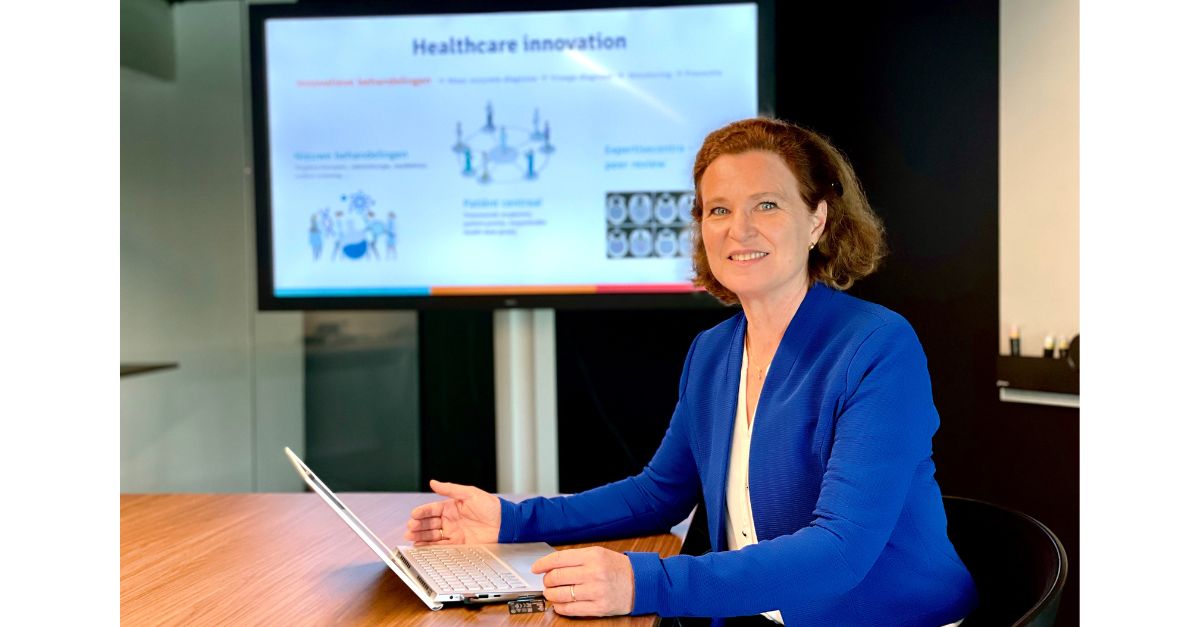
With its team of experienced business consultants, Harmony has been helping companies from various sectors with their digital transformation for more than 20 years. Besides finance, insurance and retail Harmony is now also focusing on healthcare. This focus is further strengthened with the arrival of Karin Hohmann. Karin started her career in 1994 as a management consultant and and made the switch to the hospital sector. She knows better than anyone the challenges facing the healthcare sector todayand closely follows developments in healthcare innovation. Karin therefore truly has a heart for healthcare and, together with Harmony, wants to support healthcare in the necessary transition to the healthcare of the future.
Healthcare is under enormous pressure! And Corona only added pressure, but it was also clear before Corona that the sector would be facing a difficult time. Due to an ageing population and increasing numbers of chronically ill people, the demand for care is constantly increasing toe; the government has been looking for years for solutions to keep care accessible and affordable in the future. At the same time , it is becoming increasingly difficult for healthcare institutions to find nurses and there are currently thousands of vacancies. Audits, qualityindicators and and the implementation of new applications mean that healthcare providers have less and less time left for the patient.
Karin has also experienced this herself in recent years. "Within hospitals and other healthcare institutions doctors and nurses are often involved in all kinds of innovation projects. In itself a good thing, butthe projects follow each other at an increasingly rapid pace. The JCI-, NIAZ- or Qualicor accreditation has not yet arrived, or a new patient record has to be implemented, building plans have to beworkedout or a merger prepared. Everyone in healthcare wants to deliverinnovative care, but especially with the current staff shortages there is the no time to take up new improvement- or implementationprojects in addition. Too busy to the to implement the changes to keep the work workable in the long run, so it's a vicious circle ...", says Karin.
Working even harder with fewer and fewer people will only compound the problems of attrition or burnout. The good news is that there are plenty of ideas on the table to turn the tide. The solution will have to be a combination of prevention, appropriate care (what is important to the patient himself), integrated care within primary care areas, synergy benefits through networking, patient participation and deployment of new technologies, among others. Technically, a lot is already possible to improve the quality of care while keeping it workable and affordable. Think, for instance, of AI support in diagnosis, telemedicine, online monitoring (wearables), health apps... It is unbelievable what healthcare technologies are currently coming onto the market. There is an app developed for every chronic disease. It is now waiting for scientific validation and reimbursement of these apps by NIHDI or insurers.
"Approval and reimbursement of an app does not yet mean that every patient can use it immediately. Entered data must be able to be tracked by healthcare institutions in their existing systems, there must be automatic signalling of abnormal measurements, an adapted care path to respond to this, etc. This raises numerous new questions for healthcare institutions: Which app should we choose? How do we integrate this into the EHR? What filters do we put on the entered data? How do we organise follow-up? What are the risks? Is there a positive business case? And so we are back to the question: where do we get the people to pull these projects from?", Karin continues.
One solution could be to hire consultants to pull innovation projects, but healthcare institutions are reluctant to do so. Karin understands the reluctance of healthcare institutions to hire consultants: "At first glance, it seems cheaper to hire extra FTEs for projects, but healthcare institutions often underestimate how much the deployment of their own staff really costs, not to mention the costs of absenteeism due to illness or people leaving care because they experience too high a workload and don't have enough time for the care itself. Consultants can add a lot of value by pulling the cart and ensuring that - in close cooperation with the services involved - progress is made quickly.”
"Let doctors and nurses provide input as experience experts for the necessary improvement projects and process optimisations, and we will do the rest. We know the care processes, have experience in project management and know what needs to be done to successfully implement new technologies. In this way, doctors and nurses can remain optimally committed to what they do best: providing warm care to their patients!", Karin concludes.
Wondering what Harmony can do for your organisation? Feel free to contact us via karin.hohmann@harmonygroup.eu for an informal discussion.
Markt 5
5554 CA Valkenswaard
Tel: +31 (0) 40 20 75 011
Middelweg 6-c
5253 CA Nieuwkuijk
Tel: +31 (0) 40 20 75 011
Sarajevska do broja 17
72000 Zenica